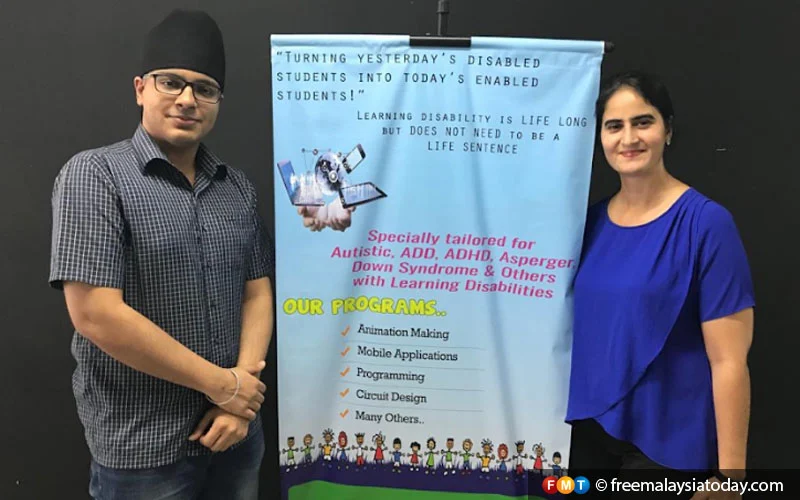The Infinite Minds Academy teaches slow learners and special needs children how to come up with nifty digital gadgets and the like so they can have a better chance at life.

SUBANG JAYA: In a small second-floor lot at an office block near the Sunway Pyramid mall, an unlikely group of teenagers regularly gathers to build apps and learn about animation and programming.
This is not your ordinary group of misfits, though. The Infinite Minds Academy trains slow learners, autistics and those with attention deficit hyperactivity disorder, Asperger’s Syndrome and Down Syndrome.
When you walk into the centre, a commercial enterprise, you’ll chance upon these young boys working on their codes and fine-tuning their very own apps. If you’re lucky, you might even see one boy hard at work on the 3D printer.
Some of these boys have gone a step further. One has designed an app for his parents to use in case he gets lost when travelling while another has built a mini tsunami warning mechanism.
IT graduate Kiren Kaur and her nephew, geoscientist Parminderjit Singh, have been running this centre since 2008. At that time, Kiren was just a freelance animator.

“What happened was, we were approached by an NGO to try and help special needs children,” Kiren told FMT in a recent interview at her centre. “And we thought, ‘Why not?’ So we gave it a try.”
She roped in her nephew to help teach the 10 or so students. Within 90 minutes, they saw amazing results – these children, who never had the chance before, were whizzes on the computers.
A few years later, Kiren decided to enrol her students, now forming a decent number, in an international cyberfair competition. To her surprise, these youngsters came out first.

“They even did interviews and got their pictures taken,” said a beaming Kiren, 47.
Not only that, the children, often shunned for their disabilities, beat some 200,000 “normal” kids from 115 countries, claimed Kiren.
After that, Kiren and her team went back to the drawing table, determined to capitalise on her team’s success and see how else technology could play a role in helping disabled children find their calling.
“We know they’re quite weak in other aspects of education,” she said. “Maybe they’re not that good at maths, for example, but even if they’re not that good in academics, who’s to say they are useless?”

Eleven years on, the centre now offers an array of digital tech-related classes and programmes for disabled youngsters. Kiren said her centre had achieved laudable results, with children who previously refused to go to school now coming daily to fine-tune their inventions. “No matter how sick they are,” she said, “they come in.
“Animation is the most demanding field for special needs children and it’s also the most rewarding.
“But I feel that the main objective of our work with these kids should be to enable them to do this on their own. So at our academy, we are changing the way we look at helping disabled kids by letting them find their own talent.”

Over the years, she said, parents had consistently expressed their fears to her team that their disabled children might not be able to make it on their own in life. “Now, they can promote their work and get paid.”
Kiren recalled how one student was suicidal prior to joining. But after joining her centre, she said, his mental state took a turn for the better and he later told his mother he wanted to be an animator.
She said being a freelance animator would not guarantee anyone a high-income salary or a fixed job. But even an average of RM2,500 per month would be more than enough for the teens, she felt.
This is not an easy job for Kiren and her team, though. For a start, the children who walk through their doors often cannot communicate properly or are unable to fully concentrate on tasks given to them.

“So we don’t go too fast with our lessons,” she said. Her team members also ensure that love and respect remain centre stage in all that they do. And it is not about who picks up new skills faster, either, she added.
“We know they can do it; it’ll just take some time. But we don’t put them down like that. We tell them that we appreciate their efforts. And a lot of the time, they are able to do it and so much more,” she said.
Kiren noted that Malaysia was still “quite backward” when it came to digitalisation but said it was incumbent on everyone to realise that this was the way forward.
If the children at her centre could do it, why not everyone else, she asked.
The latest pet project spearheaded by Kiren’s team is a digital greeting card app for Hari Raya. Those interested in supporting the centre can download the “Raya E-Card” from the Google Play Store for RM1.
Credits – https://www.freemalaysiatoday.com/



